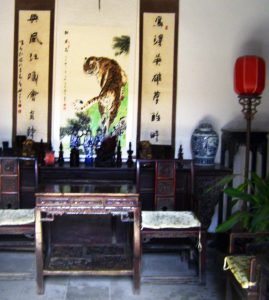 In looking though pictures I took in China some time ago, I found this picture which reminded me of the unbreakable tie between the living and dead within a Chinese family. It is reflected in what we commonly refer to as ancestor worship.
In looking though pictures I took in China some time ago, I found this picture which reminded me of the unbreakable tie between the living and dead within a Chinese family. It is reflected in what we commonly refer to as ancestor worship.
Regard for one’s family and one’s ancestors has a long, long tradition in China. It goes back to the Zhou Dynasty (1122-256 BC) and remains strong among many Chinese today. This regard—with its ritual and prominently placed table—is, as we said, sometimes called ancestor worship.
The table or altar holds pictures and/or plaques with the names of the family’s male line, for China has been a patrilineal system for thousands of years. A patrilineal system means that people count only the male side of the family as important in determining who is an ancestor and who isn’t. Your father’s side are your ancestors. Your mother’s side are not considered your ancestors, that is, they are outside your direct lineage. However, your mother–having given birth to you–will be included on your family altar, just not the rest of her lineage. Therefore, your obligations for showing reverence is only for your father’s side of the family. The latter are the people who will appear on your family altar.
Showing respect and honoring your ancestors is not a one-way street. By properly caring for your ancestors, they will, in turn, watch over and care for you. In other words, familial ties are not broken at death. Your ancestors and you are forever linked. This interconnection has been consistently supported and reinforced throughout history by both Confucian and Taoist traditions and beliefs.
Venerating your ancestors is a primary filial duty. It is because of your ancestors that you exist–that you were born and nurtured, allowing you to grow and prosper. It is only fair that you show proper recognition, regard, and respect to them. You owe your life to all of them. For this reason, people offer burning joss sticks, plates of food, and cups of tea to the ancestors by placing them before their pictures and tablets. It’s a sign of shared nurturing and support.